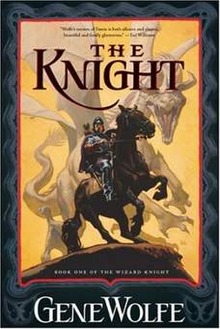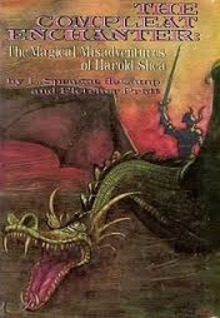The Magic Gets Measured
 In a recent Facebook posting, horror writer Jason S. Ridler had this to say about the kind of magic he prefers in fantasy novels:
In a recent Facebook posting, horror writer Jason S. Ridler had this to say about the kind of magic he prefers in fantasy novels:
If it’s not attached to emotions and mythical forces, I don’t care. Complex magic systems that are just science by another name, with lots of rules, and comparable to other magic systems with more rules, and don’t have elements of mystery , or the bizarre or the sublime… don’t interest me… I like my magic attached to the unknown and the mysterious, not the quantifiable.
For me, this reopened the discussion we often see here in Black Gate on magic as it’s used in Fantasy.
I haven’t had a chance to have this discussion with Ridler himself – since he’s in California now, and I’m still in Ontario, we no longer meet regularly for afternoons in the pub – so I don’t know which works in particular make which of his lists, but I’d have to say that the type of magic system he dislikes is the more prevalent one. Which probably explains why he’s not a mad-keen fantasy reader.
Not that there aren’t plenty of examples of the kind he does like. LOTR immediately comes to mind; as does Roger Zelazny’s early Amber novels, though I think his Dilvish the Damned stories might come closer. Slightly more up-to-date examples might include Joe Abercrombie’s The First Law series or Gene Wolfe’s Wizard/Knight.
I also think magic tends to be a lot more mysterious, bizarre, or sublime if the protagonist is not the magic user – but then, three out of five of the examples I just used contradict that thought.
I’m also not entirely sure where to place works in which the humans of the story are born with some magical ability that gets trained and perfected. I’d have to include my own Dhulyn and Parno novels here, and works such as Tanya Huff’s Four Quarters books – but not my own Mirrorlands books, where the magic users aren’t human.
Any fantasy in which there is a school of magic tends to be on the scientific side. We see this in many of Barbara Hambly’s series for example – and perhaps most obviously in the Harry Potter universe. One of the earliest examples that comes to mind as the most explicit use of the “science by another name” concept is L. Sprague de Camp and Fletcher Pratt’s Compleat Enchanter series. In these books (collected as The Complete Compleat Enchanter), a couple of experimental psychologists theorize on the existence of alternate worlds and whether it’s possible to enter these other worlds. Harold Shea, otherwise disgruntled by his life, undertakes the challenge. He doesn’t find himself in the realm he’s looking for, however, but in the world of Norse mythology.
 Have a look at Harold’s observations when he discovers he’s able to perform magic:
Have a look at Harold’s observations when he discovers he’s able to perform magic:
[Magic] was contrary to the laws of physics, chemistry, and biology. But then, where he was the laws of physics, chemistry and biology had been repealed. He was under the laws of magic. His spell had conformed exactly to those laws… This was a world in which those laws were basic. The trick was that he happened to know one of those laws, while the general run of mortals… didn’t know them. Naturally, the spells would seem mysterious to them, just as the changing color of two combined chemicals was mysterious to anyone who didn’t know chemistry.
Harold manages to return from the universe of Norse mythology, and in subsequent adventures visits the world of the Faerie Queene, then Orlando Furioso, (with a side dish of Xanadu), then the Kalevala, and finally (I think) the world of Irish mythology. As Harold gets better at magic, the stories become less about how he figures things out – the “science” of magic – and what kind of trouble his mistakes get him into and more about the adventures themselves.
The Enchanter books are a lot of fun and I’d certainly recommend them. But not to Jason Ridler.
Violette Malan is the author of the Dhulyn and Parno series of sword and sorcery adventures, as well as the Mirror Lands series of primary world fantasies. As VM Escalada, she writes the soon-to-be released Halls of Law series. Visit her website www.violettemalan.com.
I wonder how much of the problem isn’t that the magic is systematized, but that the author _tells_ us all about its systematization. Maybe Tolkien had pages and pages of notes & tables for Gandalf’s casting power, plus a D20, but just left that kind of detail out of the final story. (OK, not really.)
I notice something similar in Star Wars books when they get out the lightsabers and start talking about “Form VII” and how effective it is vs. “Form III”. Or we’ve all read novels where the fight scenes seem to move in 10-second turns and you can hear the clatter of dice in the background.
I think you’re on to something Joe. I’ve discussed elsewhere how Zelazny deliberately leaves out explanatory detail, and I’m sure that’s more than half of the charm of the Dilvish stories (the remainder is his horse).
Personally, I don’t have a preference or a disliking of either type of magic within literature, whether more “scientific” or not. For me, it all depends upon the story and which form of magic serves that story best.
For instance, if I’m perusing an R.A. Salvatore novel, no, I don’t expect or necessarily want an overly complex and/or mythic version of magic. It’s Forgotten Realms, most likely, and a fireball is a fireball is a fireball. I’m not there for the esoteric.
On the other hand, if I’m reading the likes of Gene Wolfe, for instance, then yes, I’m expecting something a little different.
I see no reason to limit myself as a reader or a writer, so why not enjoy both types of magic, at least when done well? But to each their own.
The problem is how to keep your magic unsystemic without losing the readers’ conviction that the problems that the characters face are not trivial in face of the magic.
@ TY: I have to agree with you, in that I don’t have a particular preference either. I even think it’s possible to have more than one type of magic, or system, or whatever we want to call it, in the same narrative. So much depends on what the readers themselves bring to the work.
@ Mary: you’ve hit on the very issue that keeps many people from reading fantasy in the first place. They think that because there’s “magic”, or some super scientific thing for SF avoiders, there can’t be any real plot, or any real character for that matter. As you imply, it’s the writer’s job to make sure that doesn’t happen.
I also wonder if there’s a difference between the de Camp/Pratt style (where it’s treated as a “science” with internally consistent rules and where the stories are often logic puzzles) vs. the D&D style (where a 3rd level magic user can cast 2 1st level and 1 2nd level spells per day as a form of “game balance”).
It might actually be interesting to give Jason the Enchanter books and get his reaction …
@ Joe: That IS an interesting notion. I’ll see what I can do.